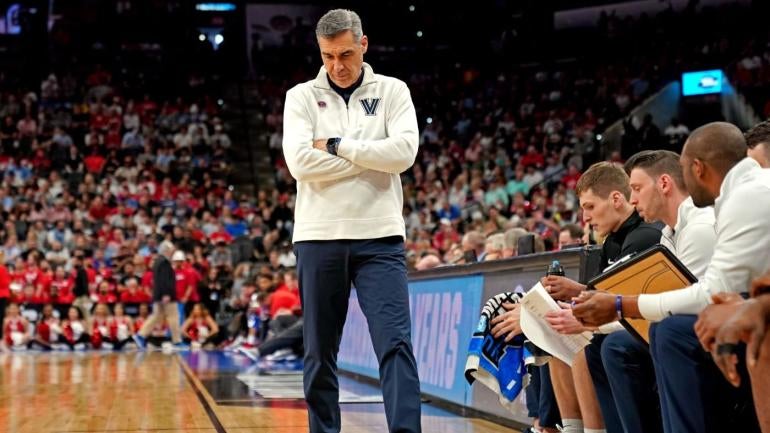
Right in the middle of the NBA Playoffs, more than two weeks after his 21st season at Villanova ended, and several years before most thought it would happen, Naismith Memorial Hall of Famer and two-time national champion coach Jay Wright announced his retirement Wednesday night.
To call it shocking is an understatement.
This is a man who is only 60 years old in a sport where coaches often work into their 70s. A man who just coached in his fourth Final Four earlier this month. A man who had a top-20 team coming back.
So why retire now?
Wright offered no real explanation in his announcement on Twitter -- but he did say he's "excited to hand over the reigns to Villanova's next coach." Put another way, he's excited to walk away -- and these next words are mine, not his -- from a profession that is more demanding and chaotic and exhausting than ever.
Again, Wright has not said any of that -- publicly. But sources have indicated that he, like many of his colleagues, simply reached a point where the job wasn't nearly as fun as it used to be because of all of the things coaches now have to deal with that didn't use to exist. Name, image and likeness rights were long overdue. The one-time transfer waiver is fair. Alternative options for high school prospects are great. Social media is fun. But even the coaches who agree with each of those previous four sentences -- and, trust me, not all of them do -- acknowledge that the combination of those things has made their jobs complex and in many ways unappealing. Do you really believe it's a coincidence that North Carolina's Roy Williams, Duke's Mike Krzyzewski and Villanova's Jay Wright all retired within 13 months of each other -- or that Maryland's coach (Mark Turgeon) and Louisville's coach (Chris Mack) just straight quit in the middle of the season?
I don't.
Needless to say, these men were all paid incredibly well to do their jobs -- but that's kind of the point. Once you've made more money than you'll probably ever need, and unless you're just addicted to being in the gym and competing during the season, why would you continue to do a job that requires your attention nearly 365 days a year when you have a family you love, other interests in general, and a desire to relax a little?
I probably wouldn't.
And this is an issue that needs to be addressed.
The one thing every former college basketball coach who becomes an NBA coach says he loves is how it allows him to A) get back to just coaching basketball without all "the other stuff," and B) enjoy an offseason in some form. Right now, college basketball coaches are constantly dealing with "the other stuff" with no real window to comfortably take even a one-week vacation. The season is overwhelming. The offseason is unpredictable and, in some ways, even more overwhelming. As many coaches have told me over the past year -- i.e., since the one-time transfer waiver became a reality, and since NIL rights became recruiting tools -- being a college basketball coach these days is a hard and frustrating way to make a lot of money.
Most will keep doing it because they still love it regardless.
Some will keep doing it because of the money.
But the truth is that a larger number of great college basketball coaches are probably going to spend the coming years and decades making enough money in their 40s and 50s so that they can leave it all behind at an earlier age than the previously expected-retirement-age for great college basketball coaches. On some level, it's impossible to not think that's what Jay Wright just did. So it's totally reasonable to wish him happiness in retirement but also be concerned about what it says about the profession he's leaving.






















